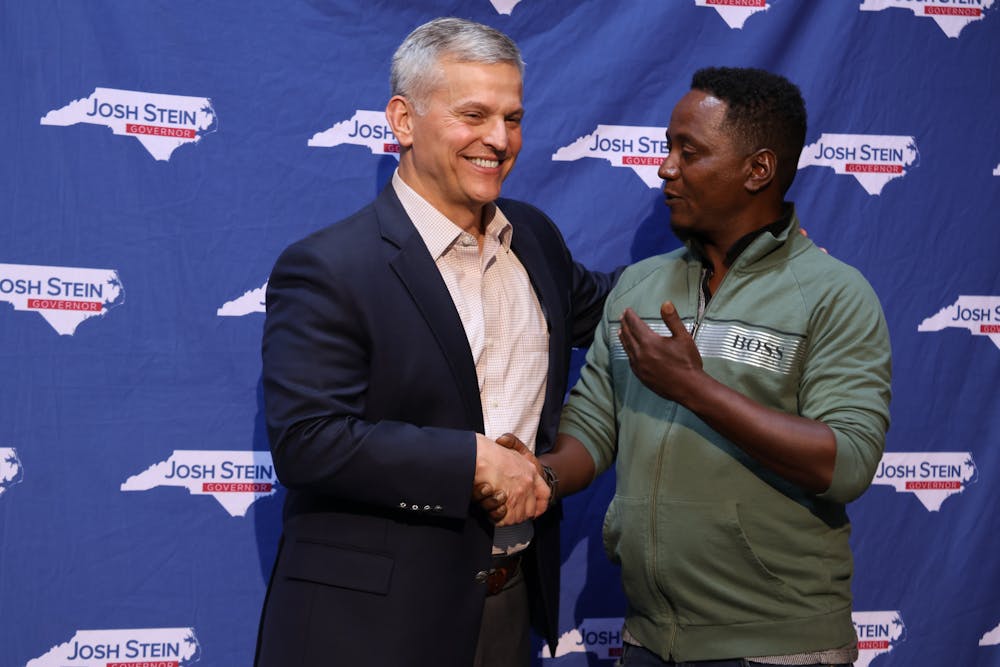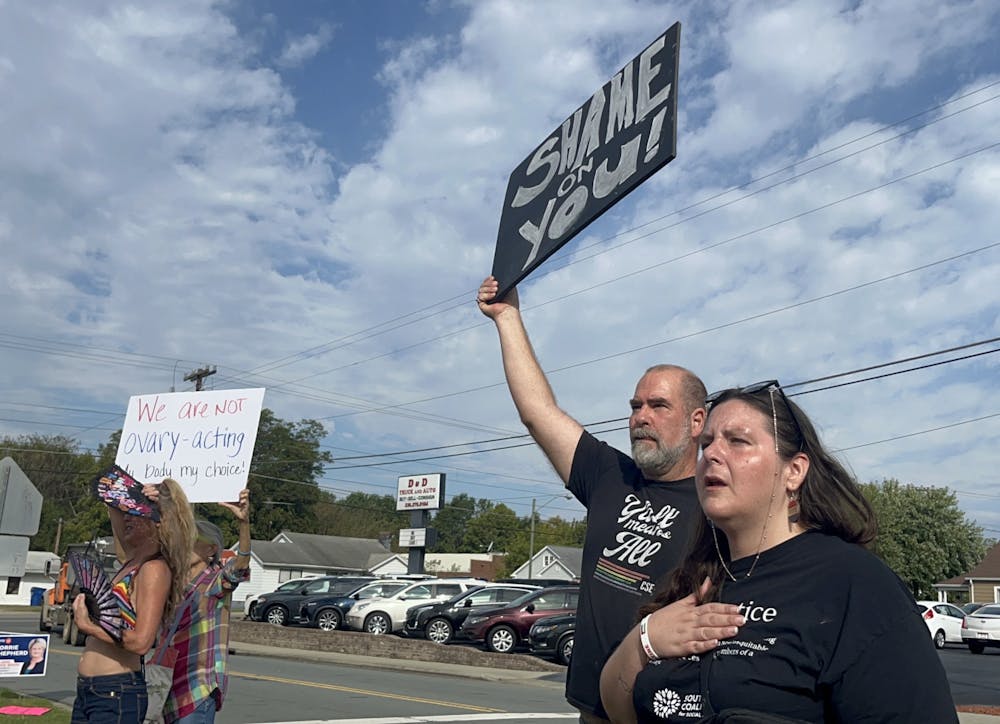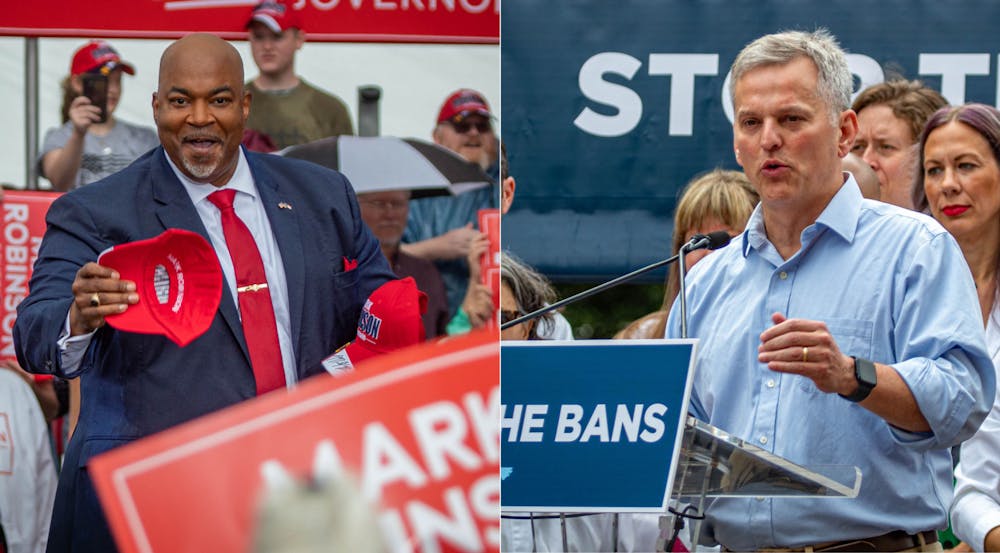North Carolina’s general election for governor is a battle between contrasts. Republican Lt. Gov. Mark Robinson will face off against Attorney General Josh Stein on Nov. 5, along with Libertarian Mike Ross, Green Party’s Wayne Turner and Constitution Party’s Vinny Smith. Ross, Smith and Turner are all polling at 3% or less, according to data from Sept. 25 to 29 in a Quinnipiac University poll.
The two main candidates disagree on a number of issues.
One of Josh Stein’s main running points is focusing on making sure that the economy works for everyone. Stein has promised to lower costs, raise the minimum wage and cut taxes for working families. Stein plans to do this through the Working Families Tax Cut that he has proposed. Stein was not available for an interview, and his campaign spokeswoman Morgan Hopkins sent a statement to Elon News Network.
“Josh Stein introduced the Working Families Tax Cut to put more money in the pockets of working families, lift children out of poverty, and stimulate local economies,” Hopkins wrote. “Specifically, the Working Families Tax Cut would benefit more than 2 million North Carolinians, including 1.2 million children. At 20 percent of the federal credit, it would put $520 dollars on average back into the pockets of working families and for a family with three children or more, it would credit them up to $1,486.”
Robinson also wants to cut taxes but aims to do it for all North Carolinians. Robinson also wants to reform the Regulatory System. Robinson and his communications team were not available for comment.

Duke University public policy professor Asher Hildebrand said he believes Robinson’s experience could help him convince voters that he’s the right candidate to improve the economy.
“He does have a history of having been more of an entrepreneur, managing different businesses, being a factory worker, he's done things that Stein hasn't,” Hildebrand said.
Both campaigns have prioritized improving education but in vastly different ways. North Carolina is 44th in K-12 public school funding across each state in 2024, and Stein has argued for increased public school funding. According to Hopkins, Stein will aim to raise teacher pay to at least the national average and to provide teachers with a $300 stipend to help cover the cost of school supplies.
Robinson, on the other hand, has claimed “school systems get better results on less money,” when speaking to the East Wake Republican Club in December 2023. Some of Robinson’s goals for improving education include increasing teacher pay and advocating for career technical education.
Another key issue that Robinson and Stein have focused on throughout the campaign process is increasing public safety. Robinson has promised to reduce violent crime and protect law enforcement while holding them to a high standard through training. Stein, the state’s chief law enforcement officer since 2017, has campaigned on the idea of recruiting “public-spirited” officers that are able to be held accountable while trying to uphold the highest commitment to justice. Stein also plans to focus on cracking down on fentanyl.
There are also a number of issues where the two of them are on two opposite sides of the spectrum. Stein supports student loan forgiveness, where Robinson doesn’t. Robinson is in favor of looser gun regulations opposed to Stein who advocates for universal background checks and raising the age required to buy an AR-15 rifle. The two are also diametrically opposed on the issues of abortion and climate change.
According to Hopkins, Stein is running to make a safer, stronger North Carolina.
“Josh is running for Governor because he believes in North Carolina’s promise — that if you work hard, where you come from should never limit how far you can go,” Hopkins wrote. “To deliver on that promise, he is committed to investing in the people of North Carolina and their futures to ensure that our economy works for everyone, our public schools are fully funded, our neighborhoods are safe, and our personal freedoms are protected.”

Attorney General Josh Stein poses for a picture with supporter after his "Real Time with Stein" event on Aug. 7 at the CityGate Dream Center in Burlington.
Hildebrand said he believes the differences between Robinson and Stein is unprecedented.
“I'm not sure we've ever had a race in the history of the state where the contrast between the two candidates is starker,” Hildebrand said.
Hildebrand said Stein fits very much into the Democratic mold, but Robinson — who only joined the political scene in the last decade — is a different candidate in many aspects. Part of Robinson’s stylistic difference with Stein is his tendency to make controversial remarks. Robinson, who has extreme positions on abortion, gay marriage and other cultural topics, has made past comments that led to much controversy around his campaign. He has made antisemitic remarks, as well as comments degrading women and the LGBTQ+ communities. In 2021, he associated gay and transgender people with the word “filth,” while also saying that they shouldn’t be allowed in public restrooms. Robinson has also supported limits of birth control in the past.
His most recent prominent remarks, however, were revealed in a CNN report — which was released on Sept. 19 — about alleged offensive remarks he made on a pornography’s website message board between 2008 and 2012. According to the report, Robinson expressed support for reinstating slavery, disparaged Martin Luther King Jr., referred to himself as a “black NAZI!” and made many sexually offensive comments. Robinson denied these comments during an interview with CNN.

Hildebrand said Robinson appealed to voters in the primaries due to his willingness to challenge political correctness, but says that it’s looking more like a liability now.
“It's looking more like a liability because it's led him to say a series of very inflammatory and in some cases, outright offensive things,” Hildebrand said. “He's kind of turned off enough people through that and there seem to be more people repelled from it by the type of outlandish things that he says.”
According to Hildebrand, this has also made Stein’s advertisements extremely effective and easy to make since most of Stein’s ads are just replaying controversial comments Robinson made.
Stein hasn’t avoided criticism, though. As the state’s top lawyer, Stein is typically asked to defend controversial laws passed by the general assembly. However, during his time in office he refused to defend the state against several political lawsuits involving abortion, elections and gerrymandering. He also refused to defend the state’s 12-week abortion ban. Stein has received criticism from many North Carolinian politicians including Senate leader Phil Berger.

North Carolina Attorney General Josh Stein, the Democratic nominee for governor, speaks inside Burlington’s Persnickety Books on March 14 as part of a “Real Time with Stein” campaign event. ENN file photo.
This election is extremely important for North Carolina, Abdullah Antepli, Duke University public policy professor and Director of Polis: Center for Politics, said.
“This particular election in November is historical because its impact, its potential consequences, its potential gains and loss have been incredibly critical,” Antepli said. “It's important because the issues that are being debated and discussed in this particular election and the somewhat contradictory visions of each candidate are so starkly different.”
Hildebrand said he sees this election as an extremely important one for the state because of its potential consequences. He said that North Carolina Republicans will almost certainly maintain their majority in the general assembly, even possibly maintaining their super majority in the House of Representatives. A win by Robinson combined with the Republican majority in the North Carolina House would lead to a severe lack of checks and balances, according to Hildebrand.
“The governor is really the only check and balance on the Republicans' governing power in North Carolina,” Hildebrand said. And if you look back at the last few years, you see the period in which Republicans have had a veto proof supermajority, and current governor Roy Cooper has therefore been much less powerful. You could only imagine with a Republican governor, and especially one as extreme as Mark Robinson, just how the legislative agenda would be produced.”
Antepli encourages young voters, like college students, to go out and vote in this election to make sure North Carolina is in good hands.
“None of the negative, discouraging futures of this election and the candidates should discourage them,” Antepli said. “It should make them more committed and if they feel the system is not allowing the best of North Carolina to rise to power, this is a call for moral action, for them to commit and fix it.”


